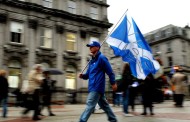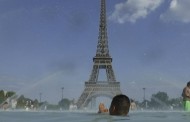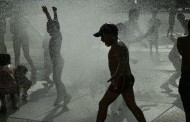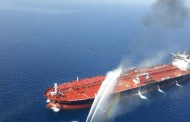
Smoke rose from the Syrian town of Kobani on Monday after United States-led airstrikes against Islamic State fighters. The town is virtually deserted of all but Kurdish and Islamic State fighters. Credit Vadim Ghirda/Associated Press
http://www.nytimes.com
(the new york times)
SURUC, Turkey — Two months after the United States began bombing militants attacking Kobani in northern Syria, the fate of the obscure border town has become the defining battle of the broader contest with the Islamic State — to solidify, or roll back, its borders and ambitions.
For Washington, Kobani is a crucial public test of President Obama’s strategy of combining American air power with local ground forces. For the Islamic State, it is a test of its image of inevitability and invincibility, and a tool for recruiting jihadists.
But of all those with an interest in Kobani, there is arguably no party as invested as the fractious Kurdish diaspora, which has pulled together in the hope of creating a homeland among the rolling farms and pistachio orchards that are still technically part of Syria.
The town is virtually deserted of all but fighters, with Kurds holding one side of town under American air cover, and militants the other. The United States and its allies have poured more bombs into Kobani than anywhere else in the fight against the group. And the militants’ leader, Abu Bakr al-Baghdadi, reportedly sent one of his top commanders, known as the group’s “minister of war,” to Kobani, where more Islamic State fighters have died than on any other battlefield.

Fighters of the Syrian Kurdish People’s Protection Unit held position early last month in Kobani. Credit Ahmed Deeb/Agence France-Presse — Getty Images
At this point, “the strategic significance is because of the psychological and the publicity importance,” said Eliot A. Cohen, a military historian at the Paul H. Nitze School of Advanced International Studies and an official in the administration of President George W. Bush.
Kobani, a quiet Kurdish community whose population had swelled from 60,000 to nearly 400,000 with refugees from Syria’s civil war, has become a focus of the many competing interests enmeshed in the regional turmoil. Saudi Arabia, Iran, Jordan, and Turkey — all heavily involved in the fight against the Islamic State — each have some stake in the outcome. The focus on Kobani has angered key Syrian rebel groups whom Mr. Obama is trying to recruit to fight the Islamic State. They are frustrated with the lack of action against the Syrian government of President Bashar al-Assad.
Kobani is for Kurds a fulcrum for a new sense of nationalism that has set in sharp relief the longstanding divisions with Turkey, which has withstood international pressure to intervene directly. So compelling is the battle, it has united three Kurdish factions — the local Syrian Kurdish militia; militants of the Kurdistan Workers’ Party, or P.K.K., from Turkey; and pesh merga fighters from Iraq.
Muhydin Salih, a Syrian Kurd from Kobani, spends his days on a hilltop in Turkey watching the battle for his hometown, separated from here by cotton fields and a border fence. He can even see his house. Atop a nearby hill, another Syrian pointed west, where Turkish tanks were sitting on a ridgeline, idle. He then pointed south toward Kobani, under siege for nearly two months, where smoke was rising.
“Look at the Turks, they are standing by,” he said. “And the Americans are bombing.”
The battle began in September as fighters with the Islamic State, also known as ISIS or ISIL, stormed through dozens of villages and appeared, in short order, on the verge of taking Kobani. Initially, United States officials said the town was of little strategic value and that the militants were likely to win.
But as the United States and its allies began bombing, and Islamic State fighters kept rushing reinforcements to the front, it suddenly became the main battlefield of the broader conflict. Turkey ultimately allowed Iraqi Kurdish fighters to transit its territory, and the Americans dropped weapons and ammunition to the Kurds, stalling the advance of the Islamic State fighters. Today, the fight has become a grinding war of attrition, a grueling house-by-house battle.
Gen. Lloyd J. Austin III, head of the United States Central Command, said last month that the Islamic State had made a decision that Kobani would be its main effort. Referring to the Islamic State, he said, “as long as he pours, you know, legions of forces there into that area, we’ll stay focused on taking him out.”
In a recent video, the Islamic State called Kobani “a haven for every enemy of the caliphate.” In the propaganda war that Kobani has become, the militant group tested a new form: It used a British hostage, John Cantlie, in the role of news correspondent, broadcasting a report from the top of a building in Kobani claiming — falsely — that it controlled 90 percent of the city and was on the verge of victory.
The battle is complicated by Turkey’s role, which sees some of the Kurdish factions as terrorists determined ultimately to destabilize Turkey to create a Kurdish state. Turkey, some analysts said, has been content to sit back and see two of its enemies — Kurdish separatists and Islamist militants — killing each other.
Turkey has insisted that a group of non-Islamist rebels, with the Free Syrian Army, or F.S.A., also join the fight for Kobani. These rebel fighters have gone reluctantly, because they see their primary enemy as the Assad government.
Abu Mohammad al-Raqqawi, an activist from Raqqa, the Islamic State’s de facto capital in Syria, who is affiliated with the F.S.A. in Kobani, said the fighters were there only because the Turks saw them as a proxy to prevent the Kurds from establishing independence within Syria. “No one is winning,” he said. “It is stationary. Why is Kobani, in the eyes of the Americans, more important than Raqqa?”
















